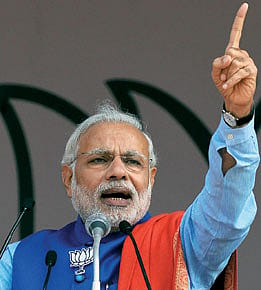A Man of Our Time

If Barack Obama's comments on religion were not intended as a warning to Narendra Modi, this book suggests they should have been. Harish Khare's point is that Modi's 'smooth and professional PR machine' expended a great deal of effort and energy on subtly denigrating Muslims and reinforcing the deep-seated, perhaps subliminal, conviction among some that Hindustan is for Hindus.
That blunt argument is camouflaged by replacing Hindu and Muslim with majority and minority like mealy-mouthed sociologists who are 'Willing to wound, and yet afraid to strike,/ Just hint a fault, and hesitate dislike' as in Pope's poem. One instance is worth repeating. Khare cites a front page lead story in Amar Ujala, 'one of the largest circulating Hindi dailies in north India', about a couple of Pakistan-based Indian Mujahideen operatives. It was titled 'Conspiracy to derail electoral process foiled, Modi was the target'. Two days later the paper reported the surprise of intelligence community analysts at the display; it also cited an unnamed senior Intelligence Bureau official who regretted that such stories should be allowed to vitiate the election environment.
But Khare wasn't taken in. He saw the report as a deliberate ploy, 'part of an ongoing mind-game intended to polarize the electorate along the majority-minority axis.' Nor does heexonerate the security establishment of guilt for participating in this cynical strategy: 'A subtle reinforcement of the Hindu unease is quite discernible.'
All the important businessmen who funded Modi's campaign, the civil servants who hope for preferment, and the academics and journalists who long ago trimmed their sails to the winning wind, will vigorously reject that explanation. They will cite Modi's own defence (which the author quotes) that he is only a sevak with one mantra, vikas. Unlike careerists who ride the Modi bandwagon for personal gain, the business community probably does believe growth is his first priority. But it will not blame him for contrasting the ease with which terrorists from Pakistan and infiltrators from Bangladesh (both Muslim countries) take up residence in India while Hindu refugees 'are denied a right to be embraced by Mother India, to find solace and comfort in Mother India's lap'. Modi felt the popular pulse and responded to it. Khare is being simplistic in comparing this response with the bloodbath of 1984. Then, Congress hoodlums (most were really the dead Sanjay Gandhi's cronies) decided to avenge Indira Gandhi's murder and smash the Khalistani mafia once and for all through a brutal pogrom. It was the mischief of a clique without national support. This time, the election outcome reflected the hopes, fears and anxieties of large numbers of Hindus who are innocent enough to believe Rama was born on that hallowed spot in Ayodhya and who have been encouraged to feel their identity is threatened at home.
Openomics 2026: Continuity and Conviction
06 Feb 2026 - Vol 04 | Issue 57
The performance state at its peak
India wanted a change which the Congress' mother-and- son team was incapable of providing. Modi did, first by purging the BJP of the more rational elements who believed in tempering rather than inciting the popular mood (Arun Jaitley remains the only credible relic of that group), and then by triumphantly riding the mood. Khare explains the phenomenon by quoting Piyush Pandey, the adman who handled Modi's campaign, as confessing, "The brief we got from the BJP said that Mr Modi's popularity was higher than the party and therefore they wanted to play it like a presidential campaign." He conveys all this through a series of jottings during the campaign. The technique may be acceptable, but a veteran journalist who has served as a prime minister's media advisor should know that anonymous sources are never fully convincing. All this 'A senior police officer told us over lunch…' and 'A well-connected journalist told me…' reminds me of one of my own reporters when I edited a national daily, whom I had to tell one day that his extensive quotations from a variety of politicians and bureaucrats read like the same person speaking , down to linguistic idiosyncrasies.
Not that Khare is to be doubted. The circumstantial evidence supports his conclusion. But a fair assessment must admit the mood Modi exploited already existed. He didn't create it. What can more justifiably be laid at his door is the 'new coarseness' the author mentions. Khare can argue perhaps that Modi's frequent flaunting of Obama's first name and of his familiarity with the American president proved his contention that the Prime Minister is 'crude, vulgar, cheap and coarse'. If so, he is in tune with the age over which he presides. One might even say, adapting the 18th century French philosopher, Joseph de Maistre,that every country gets the Prime Minister it deserves.
(Sunanda K Datta-Ray is a journalist and author of several books)
